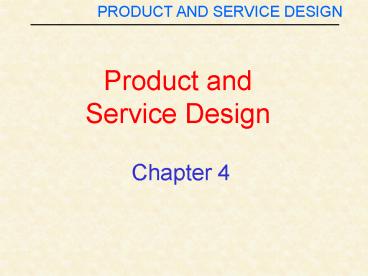Product and Service Design PowerPoint PPT Presentation
1 / 14
Title: Product and Service Design
1
Chapter 4
- Product and Service Design
2
Reasons for Product or Service Design
- Be competitive
- Increase business growth profits
- Avoid downsizing with development of new products
- Improve product quality, reduce labor and
material cost (if its a re-design) - To open a new business
3
Challenges in Product Service Design
- Increasing competitive pressure to
- Improve customer satisfaction
- Increase user-friendliness
- Reduce time to introduce new product or service
- Reducing time to produce
- Increasing environmental concerns
- Waste reduction, recycling
- Less material, less packaging
4
Manufacturing Product Development
- Idea Generation/Concept Development
- Technical and Economic feasibility
- Preliminary Design and Planning
- Detailed Engineering
- Process Selection Planning (Chap. 5)
- Pilot Production and Ramp-Up
? These activities need not be done sequentially.
In particular, 12, 34 can be done
simultaneously
CONCURRENT ENGINEERING
5
Guidelines for Manuf. Product Design
- Customer needs should be the focus
- Competitor products should be analyzed
- Feasibility analysis based on forecast sales,
investment requirements, operations capabilities
should be done - The final design should take into account
- Operational capabilities
- Manufacturability/Assembly/Disassembly (DFM, DFA,
DFD) - Legal and regulatory considerations
QUALITY FUNCTION DEPLOYMENT (QFD)
6
Two Approaches to Design
7
Disadvantage of Over-the-wall approach
8
Benefits of Concurrent Engineering
- Production/Operations capabilities and costs
become evident early in the process - - almost 75 of the cost of a product is firmed
up during design phase - Early detection of potential manufacturing
problems - Reduced time to market because of
- early error detection
- simultaneous activities
- Can you think of any disadvantages?
- Forming and managing teams
9
(No Transcript)
10
Service Design
- Services are, in general, intangible. Therefore,
there is no physical product to design. - Services cant be inventoried.
- There is more customer involvement.
- Immediate feedback.
- Many services are created and delivered at the
same time ? in many cases, the service is the
process itself.
11
Service Design (Contd.)
- Services tend to be decentralized and
geographically dispersed - Competitors can copy easily
- Location, Location, Location
- Two key issues to be decided on
- - degree of customer contact
- - variability of service requirements
12
Impact of Service Variability Customer Contact
on Service Design
Customized ?
Variability in Service Requirements
? Standardized
Degree of Contact with Customer
13
Guidelines for Service Design
- Have a unifying theme convenience, speed,
personal attention etc. - Make arrangements to cope with variability in
service requirements - Ensure reliability and consistent quality
- Make the system user-friendly (especially
important for self-service)
14
Three Approaches to Service Design
- Production Line Approach When there is low
variability in service req.s (e.g. McDonalds) - Personalized Approach When there is high
customer contact, high variability in service
req.s (e.g. Ritz-Carlton, Nordstrom Dept.) - Self-service Approach Let the customers take
more responsibility in the production of the
service (ATMs, gas stations)

